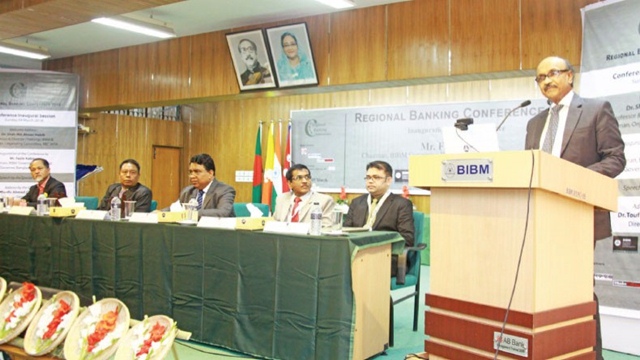RNA
Published:2018-03-05 18:17:49 BdST
Publish names of wilful loan defaulters, enforce laws
FT ONLINE
Experts at a conference on Sunday suggested that Bangladesh should adopt the practices including disclosure of names of the wilful defaulters and enforcement of rules that India and Nepal follow to deal with banks’ non-performing loans.
They made the suggestion while speaking at the business session on the opening day of a two-day Regional Banking Conference 2018 that began at the Bangladesh Institute of Bank Management in Dhaka.
They also said the government’s strategy to allow new banks to create competition among them and spread banking activities across the country and in the process bring the rural people under financial inclusion has failed.
BIBM supernumerary professor Md Yeasin Ali said, ‘We should learn good practices from each other.’
‘To tackle the non-performing loans, India publishes names of the wilful defaulters,’ he said.
Apart from that, the wilful defaulters are barred from opening any new ventures for five years, Yeasin said.
In China, air and train tickets are not sold to the defaulters as punitive measures of the government and to shame the wilful defaulters, he said.
He also mentioned that Nepal’s NPL was below two per cent, which was exemplary for other countries.
Speaking about the Nepal’s NPL ratio, former Bangladesh Bank governor Mohammed Farashuddin said, ‘Nepal has a very stringent law and they apply it.’
In Bangladesh, the combination of statutory reserve ratio and cash reserve ratio is 19 per cent, while the figure is 26 per cent in Nepal, he said.
Mentioning that the problem in the Bangladesh’s banking system started during 1991-1992, the former BB governor said that the capacities of the banks did not enhance and quality was not ensured.
Speaking about publishing names of the wilful defaulters, National Institute of Bank Management, India director KL Dhingra said that the list of the wilful defaulters was made by banks not by the central bank.
On the slowdown of Indian economy, he said that the country’s credit growth was tardy due to economic problems.
Nepal’s Sanima Bank chief executive officer Bhuvan Kumar Dahal said that the country’s loan sanction process was very much centralised that also helped the country keep NPL to a very low level.
Besides, banks are supposed to write off loans if the loans remain unpaid for one year and the defaulters’ information are preserved at
the credit information bureau, he said.
The process creates problems not only for the defaulters but also for their family members to get loans from banks in future, he said.
BIBM professor and director Shah Md Ahsan Habib, its associate professors Mohammed Sohail Mustafa and Mohammad Tazul Islam prepared a country paper on Bangladesh titled ‘a review of the activities and performance of the banking sector of Bangladesh’.
Mentioning NPL a key concern especially those of the state-owned banks, Habib said that the contemporary evidences revealed several instances of wilful default by a section of big borrowers.
Regular recapitalisation of state-owned banks has emerged as a cause of anxiety that demands immediate board-based corrective actions and legal measures, he observed.
Pointing out trade-based money laundering a growing concern for the policymakers and central banks throughout the globe, he said that improvement in capacity to enforce anti-money laundering rules and the capacity to raise red flags in the context of the country were vital.
Mentioning the low NPL in Nepal, Dhaka University business studies department dean Shibli Rubayat Ul Islam said the country (Nepal) suffered problem but managed to overcome problems within two decades and the way they overcame should be followed by Bangladesh.
He, however, said, ‘Yes, there are problems in the country’s banking system, but the achievements of the sector are much higher than the flows.’
He also suggested that the South-Asian countries should have common currency for boosting the business opportunities and to avoid losses due to exchanging currencies.
Bangladesh Bank chief economist Faisal Ahmed mentioned heavy dependency on banking, cyber risk, financial inclusion, product innovation and trust as the challenges of the regional countries.
BB governor Fazle Kabir inaugurated the conference jointly organised by BIBM, Financial Institutions Training Institute of Bhutan, National Institute of Bank Management of India and National Banking Institute of Nepal.
At the inaugural session, Kabir said, ‘Sharing of knowledge and experiences of others will certainly help us a lot in this regard.’
He also said in this age of globalisation, regional cooperation is really very important.
BIBM director general Toufic Ahmad Choudhury and Association of Bankers Bangladesh chairman Sayed Mahbubur Rahman also spoke, among others, on the occasion.
Unauthorized use or reproduction of The Finance Today content for commercial purposes is strictly prohibited.


